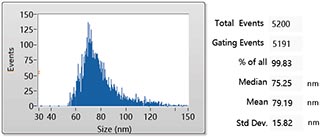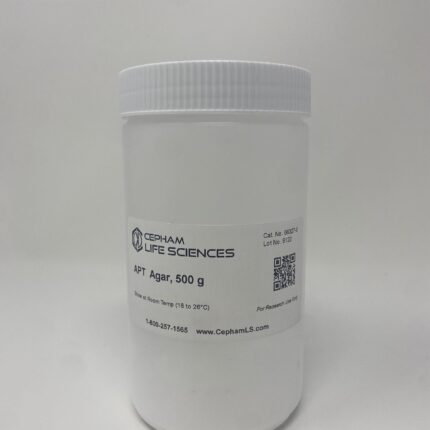Exosomes are nanoscale vesicles (30-150 nm) secreted by almost all cells, with phospholipid bilayer structure, containing complex parent cells-deriving cargos including DNA, sRNA (mRNA, microRNA, and non-coding RNAs), proteins, lipids, and other substances. Exosome-carried cargo can reflect the status and molecular characteristics of parent cells. So isolating and extracting exosomes can help to study the functions and features of the parent cells and thus analyze diseases.
This exosome isolation kit provides a simple and reliable method to extract intact exosomes from the cell supernatant. Comparing with other well-known brand kits, cell supernatant exosome isolation kit provided by CUSABIO has its own features. It is suitable for the isolation of exosomes from the supernatant of a variety of cells. And the exosomes isolated by this kit are comparable to ultracentrifugation with High Purity and High Yield. Moreover, this kit is simple to use and no equipment requirement. Exosomal vesicles isolated by this product are suitable for various downstream applications, such as electron microscopy analysis, NTA analysis, NanoFCM analysis, Western Blot, fluorescence quantitative (qPCR), and high-throughput sequencing, etc.
Recent studies have shown that exosomes act as a connection between cells that can transport proteins, lipids, and nucleic acid to the target cells and also as tools for disease diagnosis, as well as related clinical biomarkers. They play a role in various pathological physiological processes, such as blood vessel formation, antigen presentation, apoptosis, tissue repair, immune reaction and inflammation, tumor growth and metastasis, and so on. Exosomes can also be engineered as a drug transport system directed to diseased tissues or organs.
Obtaining high-purity and intact exosomes is an essential prerequisite for exosome research. Although there are multiple traditional methods for exosome isolation, low purity and yield are the major problems. Cepham Life Sciences offers Exosome Isolation Kits (affinity purification) that can rapidly and efficiently isolate intact and high-purity exosomes from the cell culture medium and body fluid, including cell culture supernatant, serum, plasma, breast milk, and urine.
Product Features
- Suitable for many downstream experiments:
-
- The kit can be used in many downstream experiments, including Transmission electron microscope analysis, Nanoparticle tracking analysis, NanoFCM analysis, Western Blot, Fluorescence quantitative (qPCR), High-Throughput Sequencing, etc.
- Suitable for a variety of sample types:
- The kit provides a simple and reliable method to extract intact exosomes from the cell culture supernatant, serum, plasma, Breast Milk, urine, saliva, Yeast, Plant
- Can be used in the supernatant of a variety of cells:
- The kit can be used to isolate exosomes from the supernatant of various cells, such as A375, HEPG2, PC-3, Hela, U87, MG63, etc.
- High Purity:
- The exosomes extracted by CUSABIO kits are spherical or dish-shaped with uniform particles. And the vesicles are structurally intact. The following are a part of the results.
- High Yield:
- There are up to 3 x 1011particles of purified exosomes per milliliter.
- Simple to Use:
- No ultracentrifugation or phenol/chloroform step required. No equipment requirement. Just follow our protocol, you will get the exosomes soon.
- Competitive prices:
- We have an efficient production and management system so that we can manufacture premium Exosome isolation kits at less cost and our customers can get better price.
Useful Q&A
- What are exosomes used for? Exosomes contain cell-specific cargos of nucleic acids, proteins, lipids, and metabolites, which facilitate intercellular communication that contributes to a spectrum of biological processes in health and disease. Exosomes are related to immune responses, viral pathogenicity, chronic inflammation, neurodegenerative and cardiovascular diseases, even cancer progression. Additionally, exosomes are engineered to therapeutic nanocarriers for drug and gene delivery to the desired target, thus achieving the therapeutic control of many diseases.
- How do exosomes work? Upon exosome binding to target cells through ligand-receptor interactions, the contents of exosomes are internalized into recipient cells. These biological active molecules, such as proteins, lipids, and genetic materials, that mediate exosomal intercellular communication, ultimately reprograming the recipient cells.
- Are exosomes good or bad? Exosomes play a dual role in human health. They keep cell health by removing damaged and unwanted proteins and structures in the cells. And they are also involved in immunity and reproduction in healthy individuals. However, cancer-derived exosomes participate in tumor growth, progression, dissemination, angiogenesis, and metastasis by transferring their cargoes of cytokines, mRNAs, and miRNAs to targeted cells. Anti-cancer therapy resistance is also attributed to exosomes of tumor origin. Besides, some exosomes are implicated in the pathogenesis of the disease, including neurodegenerative and cardiovascular diseases.
- What is exosome therapy? Exosome therapy is a form of regenerating treatment in which therapeutic payloads are delivered through exosomes to the affected site to achieve therapeutic effects. Therapeutic exosomes are administered through injection or infusion into the treatment location, where they target and release their content of endogenous and modified bioactive molecules, such as miRNA and proteins into damaged cells or tissues, stimulating quicker healing and diminish inflammation.
- Are exosomes better than stem cells? Compared to stem cells, exosomes are simpler, safer, cheaper, more easily stored and transported. In terms of therapeutic effects, exosome shows very low immunogenicity and do not trigger complications. Additionally, exosomes can not replicate, do not deteriorate, and are not infected by viruses.








